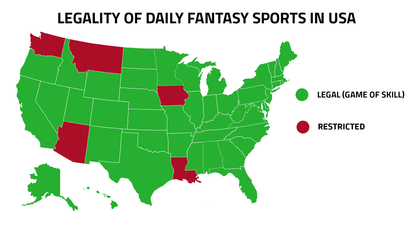Menu
Fantasy sports gambling finally gets scrutinized
 States where fantasy sports gambling is allowed as a game of "skill."
States where fantasy sports gambling is allowed as a game of "skill."
Sportsmanship aside, the purpose of competitive sports is to determine a winner. It doesn’t matter whether you win by a landslide or by a single point, whether you win because you were clearly better, or simply because you got luck. You won. Fair and square. End of story.
Then fantasy leagues come along, where what matters are individual and, in the case of defense, team statistics. Participants take a much greater interest in the performance of individuals and other statistics. The commercial version of these are gambling sites: put up money in an attempt to win more money. Now word comes via Joe Drape and Jacqueline Williams in an October 5, 2015, New York Times article that an employee of one of the fantasy sports sites used information to make a bundle on a competing site.
An October 5, 2015, New York Times editorial states that fantasy sports gambling gives people more ways to bet on the outcome of sports, which “is sure to threaten the integrity of sports and create more gambling addicts.”
In a September 15, 2015, article, Forbes’ Darren Heitner reports on efforts by U.S. Rep. Frank Pallone, Jr. (D-NJ) to review the legal status of fantasy sports gambling sites. The sites base their legal standing on the Unlawful Internet Gambling Enforcement Act of 2006 (UIGEA), which distinguishes contests of skill from games of chance. As Heitner points out, one legal question is whether making choices on fantasy sports sites is skill or chance.
A bigger question is the effect of gambling of any kind on the integrity of sports, which are presented as a paragon of American virtues. The National Basketball Association, Major League Baseball, and Comcast are among the big investors in fantasy sports sites, and there are huge investments that would be jeopardized by a change in the legal status of fantasy sports gambling.
I readily admit that I don’t get fantasy sports. At the risk of repeating myself, the only stat that matters is the final score. Go Lions! (Yeah, right.)
Then fantasy leagues come along, where what matters are individual and, in the case of defense, team statistics. Participants take a much greater interest in the performance of individuals and other statistics. The commercial version of these are gambling sites: put up money in an attempt to win more money. Now word comes via Joe Drape and Jacqueline Williams in an October 5, 2015, New York Times article that an employee of one of the fantasy sports sites used information to make a bundle on a competing site.
An October 5, 2015, New York Times editorial states that fantasy sports gambling gives people more ways to bet on the outcome of sports, which “is sure to threaten the integrity of sports and create more gambling addicts.”
In a September 15, 2015, article, Forbes’ Darren Heitner reports on efforts by U.S. Rep. Frank Pallone, Jr. (D-NJ) to review the legal status of fantasy sports gambling sites. The sites base their legal standing on the Unlawful Internet Gambling Enforcement Act of 2006 (UIGEA), which distinguishes contests of skill from games of chance. As Heitner points out, one legal question is whether making choices on fantasy sports sites is skill or chance.
A bigger question is the effect of gambling of any kind on the integrity of sports, which are presented as a paragon of American virtues. The National Basketball Association, Major League Baseball, and Comcast are among the big investors in fantasy sports sites, and there are huge investments that would be jeopardized by a change in the legal status of fantasy sports gambling.
I readily admit that I don’t get fantasy sports. At the risk of repeating myself, the only stat that matters is the final score. Go Lions! (Yeah, right.)
